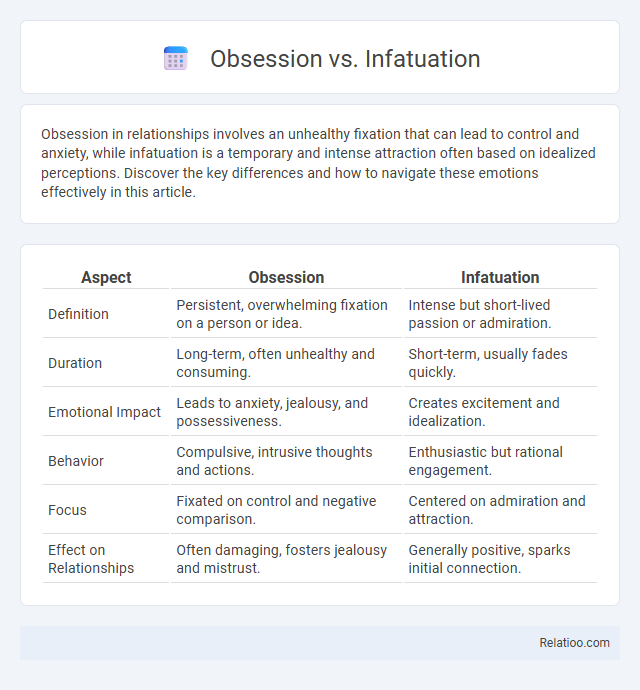Obsession in relationships involves an unhealthy fixation that can lead to control and anxiety, while infatuation is a temporary and intense attraction often based on idealized perceptions. Discover the key differences and how to navigate these emotions effectively in this article.
Table of Comparison
| Aspect | Obsession | Infatuation |
|---|---|---|
| Definition | Persistent, overwhelming fixation on a person or idea. | Intense but short-lived passion or admiration. |
| Duration | Long-term, often unhealthy and consuming. | Short-term, usually fades quickly. |
| Emotional Impact | Leads to anxiety, jealousy, and possessiveness. | Creates excitement and idealization. |
| Behavior | Compulsive, intrusive thoughts and actions. | Enthusiastic but rational engagement. |
| Focus | Fixated on control and negative comparison. | Centered on admiration and attraction. |
| Effect on Relationships | Often damaging, fosters jealousy and mistrust. | Generally positive, sparks initial connection. |
Understanding Obsession vs Infatuation
Obsession involves persistent, intrusive thoughts that dominate one's mind, often leading to unhealthy behaviors and emotional distress, while infatuation is characterized by intense but short-lived passion or admiration typically based on idealized perceptions. Understanding obsession versus infatuation requires recognizing that obsession can impair daily functioning and emotional well-being, whereas infatuation often fades as reality and deeper knowledge of the person or situation emerge. Distinguishing these states is crucial for managing relationships and mental health effectively.
Key Differences: Obsession and Infatuation
Obsession involves an overwhelming, persistent preoccupation with a person or idea, often leading to compulsive behaviors and emotional distress, whereas infatuation is characterized by intense but short-lived feelings of attraction and idealization without deep emotional attachment. Obsession can impede daily functioning and may stem from underlying psychological issues, while infatuation typically fades as reality and emotional maturity develop. Understanding these differences is crucial for recognizing healthy versus unhealthy emotional experiences in relationships.
Psychological Roots of Obsession
The psychological roots of obsession primarily stem from underlying anxiety, unresolved trauma, or attachment issues that trigger persistent, intrusive thoughts. Obsession differs from infatuation by its compulsive nature, driven by deep-seated emotional needs and often linked to disorders such as OCD or personality disorders. Understanding these cognitive and emotional mechanisms helps distinguish obsession from transient infatuation or intense passion.
The Science Behind Infatuation
Infatuation triggers intense activation in the brain's reward system, particularly the ventral tegmental area and caudate nucleus, releasing dopamine that creates feelings of euphoria and craving. Neuroscientific studies reveal that infatuation enhances focus and energy, often leading to idealized perceptions of the object of affection. Understanding these neural mechanisms distinguishes infatuation from obsession and attachment by highlighting its temporary, reward-driven nature.
Signs You’re Dealing with Obsession
Obsession is characterized by persistent, intrusive thoughts and behaviors that dominate your daily life, unlike infatuation, which is typically short-lived and intense, or attraction, which is more balanced and rational. Signs you're dealing with obsession include constant preoccupation with a person or idea, inability to focus on anything else, and compulsive actions driven by anxiety or fear of loss. Recognizing these signs early helps protect your mental health and maintain healthy relationships.
How to Recognize Infatuation
Infatuation is characterized by intense but short-lived passion that often leads to idealizing someone without truly knowing them. You can recognize infatuation by its overwhelming emotional intensity, rapid onset, and focus on physical attraction or superficial qualities rather than deep emotional connection. Understanding these signs helps differentiate infatuation from genuine love or unhealthy obsession.
Healthy Relationships: Avoiding Extremes
Healthy relationships thrive on balance, where infatuation sparks initial attraction, attraction deepens into affection, and obsession is avoided to prevent emotional harm. Your emotional well-being depends on recognizing the difference between passionate connection and unhealthy fixation, fostering mutual respect and understanding. Maintaining boundaries and open communication helps you avoid extremes and build lasting, fulfilling partnerships.
Emotional Impact: Obsession vs Infatuation
Obsession triggers intense emotional turmoil, often leading to anxiety, possessiveness, and an overwhelming need for control that can disrupt Your daily life and mental health. Infatuation, however, causes a powerful but fleeting rush of excitement and idealization, marked by hopeful anticipation and a focus on positive feelings. Understanding these differences helps You recognize when emotions shift from temporary attraction to potentially harmful fixation.
Managing Intense Feelings Safely
Managing intense feelings safely requires understanding the differences between obsession, infatuation, and love. Obsession involves persistent, intrusive thoughts that can disrupt daily life, while infatuation is a short-lived, intense admiration lacking deep emotional connection. You can maintain emotional balance by recognizing these states early and seeking healthy outlets for your feelings, such as mindfulness, communication, and professional support when necessary.
When to Seek Help for Unhealthy Attachments
Recognizing when obsession or infatuation shifts into unhealthy attachment is crucial for your mental health. Persistent, intrusive thoughts about a person that disrupt daily functioning or lead to anxiety, depression, or impaired relationships signal the need for professional help. Seeking therapy can provide strategies to manage emotions, establish boundaries, and promote healthy attachment patterns.

Infographic: Obsession vs Infatuation
 relatioo.com
relatioo.com